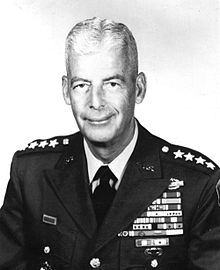Paul L. Freeman, Jr.
| Paul L. Freeman, Jr. | |
|---|---|

General Paul L. Freeman, Jr.
|
|
| Born |
June 29, 1907 Philippines |
| Died | April 17, 1988 (aged 80) Monterey California |
| Allegiance | United States of America |
| Service/branch |
|
| Years of service | 1929–1967 |
| Rank |
|
| Commands held | U.S. Army Europe Continental Army Command 4th Infantry Division 2nd Infantry Division 23rd Infantry Regiment |
| Battles/wars |
World War II Korean War |
| Awards |
Distinguished Service Cross Silver Star (2) Legion of Merit Bronze Star "V" device (4) Air Medal Purple Heart |
Paul Lamar Freeman, Jr. (June 29, 1907–April 17, 1988) was a United States Army four-star general who served as Commander in Chief, U.S. Army Europe/Commander, Central Army Group (CINCUSAREUR/COMCENTAG) from 1962 to 1965 and Commanding General, U.S. Continental Army Command (CG CONARC) from 1965 to 1967.
Freeman was born June 29, 1907, in the Philippine Islands, son of Paul Lamar and Emma (Rosenbaum) Freeman. He graduated from the United States Military Academy on June 13, 1929, with a class ranking of 213 and commissioned in the infantry. His first assignment was at Fort Sam Houston with the 9th Infantry Division. While in Texas, he married Mary Ann Fishburn on August 18, 1932, and had one daughter. A month after getting married, he reported to Fort Benning to attend the Officer's Course at the Infantry School, then was assigned to Tianjin (then called Tientsin) in China with the 15th Infantry Regiment until 1936. Upon his return to the U.S. he was assigned to Fort Washington, Maryland and was a company commander in the 12th Infantry Regiment, and subsequently returned to Fort Benning for the Tank Course. He then spent a year as company and battalion Maintenance Officer with the 66th Infantry Regiment.
At the time of the United States entry into World War II, Freeman was in China again, in Beijing as a language student and concurrently as Assistant Military Attaché at the American embassy. Shortly after the attack on Pearl Harbor, he was assigned to the U.S. Military Mission to China, and a few months later reassigned to the staff of the China India Burma Theater as an instructor to Chinese and Indian Armies. He remained on the theater staff until September 1943, when he returned to Washington D.C., as a staff officer. Towards the end of the war in late 1944, he was sent to Rio de Janeiro, Brazil as Director of Arms Training for the Joint Brazil-United States Military Commission, a position he held until October 1947. He returned to the Army General Staff in Washington D.C., working in the Latin American Branch of the Plans and Operating Division, then from 1948 to 1950, served as a member of the Joint Brazil-U.S. Military Commission, and was also a member of the U.S. Army delegation to the Inter-American Defense Board.
...
Wikipedia
